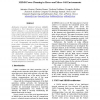Free Online Productivity Tools
i2Speak
i2Symbol
i2OCR
iTex2Img
iWeb2Print
iWeb2Shot
i2Type
iPdf2Split
iPdf2Merge
i2Bopomofo
i2Arabic
i2Style
i2Image
i2PDF
iLatex2Rtf
Sci2ools
ISCC
2007
IEEE
2007
IEEE
MBMS Power Planning in Macro and Micro Cell Environments
Multimedia Broadcast Multicast Services (MBMS), introduced in Third Generation Partnership Project (3GPP) Release 6, is a point-to-multipoint downlink bearer service that addresses the need for the efficient usage of the expensive radio resources. Power control is one of the most important aspects in MBMS due to the fact that Node B’s transmission power is a limited resource and must be shared among all MBMS users in a cell. Consequently, the analysis of transmitted power plays a fundamental role in the planning and optimization process of Universal Mobile Telecommunications System (UMTS) radio access networks. This paper investigates several factors affecting Node B’s transmission power levels such as, cell deployment, propagation models, Quality of Service (QoS) requirements, users’ distributions and mobility issues. Finally, different transport channels for the transmission of the multicast data over the UTRAN interfaces are considered.
Communications | ISCC 2007 | Node B Transmission | Point-to-multipoint Downlink Bearer | Transmission Power |
| Added | 04 Jun 2010 |
| Updated | 04 Jun 2010 |
| Type | Conference |
| Year | 2007 |
| Where | ISCC |
| Authors | Antonios G. Alexiou, Christos Bouras, Vasileios Kokkinos, Evangelos Rekkas |
Comments (0)

